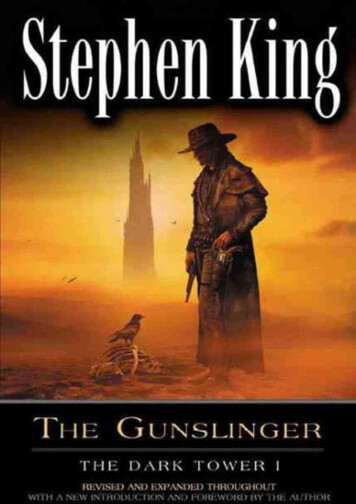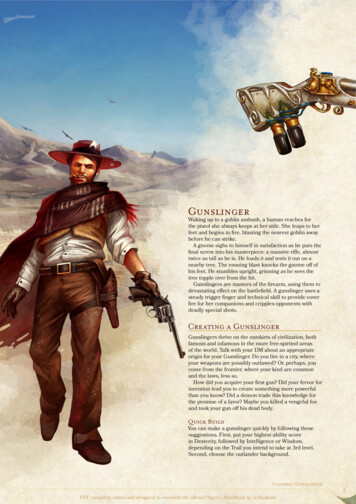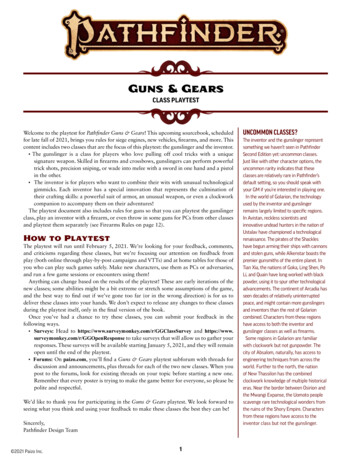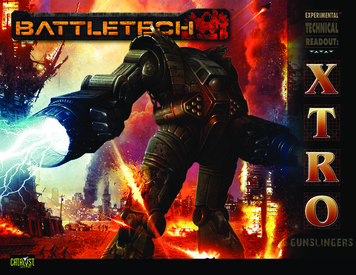
Transcription
This is a work of fiction. Names, characters, places, and incidents are either the product ofthe author’s imagination or are used fictitiously, and any resemblance to actual persons,living or dead, business establishments, events or locales is entirely coincidental.THE GUNSLINGERA Viking Penguin Book / published by arrangement with the authorAll rights reserved.Copyright 1982, 2003 by Stephen KingThis book may not be reproduced in whole or part, by mimeograph or any other means,without permission. Making or distributing electronic copies of this book constitutescopyright infringement and could subject the infringer to criminal and civil liability.For information address:The Berkley Publishing Group, a division of Penguin Putnam Inc.,375 Hudson Street, New York, New York 10014.The Penguin Putnam Inc. World Wide Web site address is http://www.penguinputnam.comISBN: 1-101-14645-1A VIKING BOOK Viking Penguin Books first published by The Penguin Publishing Group, a member ofPenguin Putnam Inc.,375 Hudson Street, New York, New York 10014.VIKING and the “VIKING” design are trademarks belonging to Penguin Putnam Inc.Electronic edition: June, 2003
ALSO BY STEPHEN KINGNOVELSCarrie’Salem’s LotThe ShiningThe StandThe Dead ZoneFirestarterCujoChristinePet SemataryCycle of the WerewolfThe Talisman (with Peter Straub)ItThe Eyes of the DragonMiseryThe TommyknockersTHE DARK TOWER II:The Drawing of the ThreeTHE DARK TOWER III:The Waste LandsThe Dark HalfNeedful ThingsGerald’s GameDolores ClaiborneInsomniaRose MadderDesperationThe Green MileTHE DARK TOWER IV:Wizard and GlassBag of BonesThe Girl Who Loved Tom Gordon
DreamcatcherBlack House (with Peter Straub)From a Buick 8AS RICHARD BACHMANRageThe Long WalkRoadworkThe Running ManThinnerThe RegulatorsCOLLECTIONSNight ShiftDifferent SeasonsSkeleton CrewFour Past MidnightNightmares and DreamscapesHearts in AtlantisEverything’s EventualSCREENPLAYSCreepshowCat’s EyeSilver BulletMaximum OverdrivePet SemataryGolden YearsSleepwalkersThe StandThe ShiningRose RedThe Storm of the CenturyNONFICTIONDanse Macabre
On Writing
To ED FERMAN,Who took a chance on these stories, one by one.
ContentsILLUSTRATIONSINTRODUCTION On Being Nineteen (and a Few Other Things)ForewordThe GUNSLINGERCHAPTER ONE The GunslingerThe WAY STATIONCHAPTER TWO The Way StationThe ORACLE AND THE MOUNTAINSCHAPTER THREE The Oracle and the MountainsThe SLOW MUTANTSCHAPTER FOUR The Slow MutantsThe GUNSLINGER AND THE MAN IN BLACKCHAPTER FIVE The Gunslinger and the Man in Black
ILLUSTRATIONSSILENCE CAME BACK IN, FILLING JAGGED SPACES(THE GUNSLINGER)facing page ref-1, ref-2THEY PAUSED LOOKING UP AT THE DANGLING,TWISTING BODY (THE WAY STATION)facing page ref-3HE COULD SEE HIS OWN REFLECTION (THE ORACLE AND THE MOUNTAINS)following page ref-4THE BOY SHRIEKED ALOUD (THE SLOW MUTANTS)facing page ref-5THERE THE GUNSLINGER SAT, HIS FACE TURNED UP INTO THE FADINGLIGHT(THE GUNSLINGER AND THE MAN IN BLACK)facing page ref-6
INTRODUCTIONOn Being Nineteen(and a Few Other Things)IHobbits were big when I was nineteen (a number of some import in the stories you areabout to read).There were probably half a dozen Merrys and Pippins slogging through the mud at MaxYasgur’s farm during the Great Woodstock Music Festival, twice as many Frodos, andhippie Gandalfs without number. J.R.R. Tolkien’s The Lord of the Rings was madlypopular in those days, and while I never made it to Woodstock (say sorry), I suppose I wasat least a halfling-hippie. Enough of one, at any rate, to have read the books and fallen inlove with them. The Dark Tower books, like most long fantasy tales written by men andwomen of my generation (The Chronicles of Thomas Covenant, by Stephen Donaldson,and The Sword of Shannara, by Terry Brooks, are just two of many), were born out ofTolkien’s.But although I read the books in 1966 and 1967, I held off writing. I responded (andwith rather touching wholeheartedness) to the sweep of Tolkien’s imagination—to theambition of his story—but I wanted to write my own kind of story, and had I started then,I would have written his. That, as the late Tricky Dick Nixon was fond of saying, wouldhave been wrong. Thanks to Mr. Tolkien, the twentieth century had all the elves andwizards it needed.In 1967, I didn’t have any idea what my kind of story might be, but that didn’t matter; Ifelt positive I’d know it when it passed me on the street. I was nineteen and arrogant.Certainly arrogant enough to feel I could wait a little while on my muse and mymasterpiece (as I was sure it would be). At nineteen, it seems to me, one has a right to bearrogant; time has usually not begun its stealthy and rotten subtractions. It takes away yourhair and your jump-shot, according to a popular country song, but in truth it takes away alot more than that. I didn’t know it in 1966 and ’67, and if I had, I wouldn’t have cared. Icould imagine—barely—being forty, but fifty? No. Sixty? Never! Sixty was out of thequestion. And at nineteen, that’s just the way to be. Nineteen is the age where you sayLook out, world, I’m smokin’ TNT and I’m drinkin’ dynamite, so if you know what’s goodfor ya, get out of my way—here comes Stevie.Nineteen’s a selfish age and finds one’s cares tightly circumscribed. I had a lot of reach,and I cared about that. I had a lot of ambition, and I cared about that. I had a typewriterthat I carried from one shithole apartment to the next, always with a deck of smokes in my
pocket and a smile on my face. The compromises of middle age were distant, the insults ofold age over the horizon. Like the protagonist in that Bob Seger song they now use to sellthe trucks, I felt endlessly powerful and endlessly optimistic; my pockets were empty, butmy head was full of things I wanted to say and my heart was full of stories I wanted to tell.Sounds corny now; felt wonderful then. Felt very cool. More than anything else I wantedto get inside my readers’ defenses, wanted to rip them and ravish them and change themforever with nothing but story. And I felt I could do those things. I felt I had been made todo those things.How conceited does that sound? A lot or a little? Either way, I don’t apologize. I wasnineteen. There was not so much as a strand of gray in my beard. I had three pairs ofjeans, one pair of boots, the idea that the world was my oyster, and nothing that happenedin the next twenty years proved me wrong. Then, around the age of thirty-nine, mytroubles set in: drink, drugs, a road accident that changed the way I walked (among otherthings). I’ve written about them at length and need not write about them here. Besides, it’sthe same for you, right? The world eventually sends out a mean-ass Patrol Boy to slowyour progress and show you who’s boss. You reading this have undoubtedly met yours (orwill); I met mine, and I’m sure he’ll be back. He’s got my address. He’s a mean guy, a BadLieutenant, the sworn enemy of goofery, fuckery, pride, ambition, loud music, and allthings nineteen.But I still think that’s a pretty fine age. Maybe the best age. You can rock and roll allnight, but when the music dies out and the beer wears off, you’re able to think. And dreambig dreams. The mean Patrol Boy cuts you down to size eventually, and if you start outsmall, why, there’s almost nothing left but the cuffs of your pants when he’s done withyou. “Got another one!” he shouts, and strides on with his citation book in his hand. So alittle arrogance (or even a lot) isn’t such a bad thing, although your mother undoubtedlytold you different. Mine did. Pride goeth before a fall, Stephen, she said and then Ifound out—right around the age that is 19 x 2—that eventually you fall down, anyway. Orget pushed into the ditch. At nineteen they can card you in the bars and tell you to get thefuck out, put your sorry act (and sorrier ass) back on the street, but they can’t card youwhen you sit down to paint a picture, write a poem, or tell a story, by God, and if youreading this happen to be very young, don’t let your elders and supposed betters tell youany different. Sure, you’ve never been to Paris. No, you never ran with the bulls atPamplona. Yes, you’re a pissant who had no hair in your armpits until three years ago—but so what? If you don’t start out too big for your britches, how are you gonna fill ’emwhen you grow up? Let it rip regardless of what anybody tells you, that’s my idea; sitdown and smoke that baby.III think novelists come in two types, and that includes the sort of fledgling novelist I wasby 1970. Those who are bound for the more literary or “serious” side of the job examineevery possible subject in light of this question: What would writing this sort of story meanto me? Those whose destiny (or ka, if you like) is to include the writing of popular novelsare apt to ask a very different one: What would writing this sort of story mean to others?
The “serious” novelist is looking for answers and keys to the self; the “popular” novelist islooking for an audience. Both kinds of writer are equally selfish. I’ve known a good many,and will set my watch and warrant upon it.Anyway, I believe that even at the age of nineteen, I recognized the story of Frodo andhis efforts to rid himself of the One Great Ring as one belonging to the second group.They were the adventures of an essentially British band of pilgrims set against a backdropof vaguely Norse mythology. I liked the idea of the quest—loved it, in fact—but I had nointerest in either Tolkien’s sturdy peasant characters (that’s not to say I didn’t like them,because I did) or his bosky Scandinavian settings. If I tried going in that direction, I’d getit all wrong.So I waited. By 1970 I was twenty-two, the first strands of gray had showed up in mybeard (I think smoking two and a half packs of Pall Malls a day probably had something todo with that), but even at twenty-two, one can afford to wait. At twenty-two, time is stillon one’s side, although even then that bad old Patrol Boy’s in the neighborhood andasking questions.Then, in an almost completely empty movie theater (the Bijou, in Bangor, Maine, if itmatters), I saw a film directed by Sergio Leone. It was called The Good, the Bad, and theUgly, and before the film was even half over, I realized that what I wanted to write was anovel that contained Tolkien’s sense of quest and magic but set against Leone’s almostabsurdly majestic Western backdrop. If you’ve only seen this gonzo Western on yourtelevision screen, you don’t understand what I’m talking about—cry your pardon, but it’strue. On a movie screen, projected through the correct Panavision lenses, TG, TB, & TU isan epic to rival Ben-Hur. Clint Eastwood appears roughly eighteen feet tall, with eachwiry jut of stubble on his cheeks looking roughly the size of a young redwood tree. Thegrooves bracketing Lee Van Cleef’s mouth are as deep as canyons, and there could be athinny (see Wizard and Glass) at the bottom of each one. The desert settings appear tostretch at least out as far as the orbit of the planet Neptune. And the barrel of each gunlooks to be roughly as large as the Holland Tunnel.What I wanted even more than the setting was that feeling of epic, apocalyptic size. Thefact that Leone knew jack shit about American geography (according to one of thecharacters, Chicago is somewhere in the vicinity of Phoenix, Arizona) added to the film’ssense of magnificent dislocation. And in my enthusiasm—the sort only a young personcan muster, I think—I wanted to write not just a long book, but the longest popular novelin history. I did not succeed in doing that, but I feel I had a decent rip; The Dark Tower,volumes one through seven, really comprise a single tale, and the first four volumes run tojust over two thousand pages in paperback. The final three volumes run another twentyfive hundred in manuscript. I’m not trying to imply here that length has anythingwhatsoever to do with quality; I’m just saying that I wanted to write an epic, and in someways, I succeeded. If you were to ask me why I wanted to do that, I couldn’t tell you.Maybe it’s a part of growing up American: build the tallest, dig the deepest, write thelongest. And that head-scratching puzzlement when the question of motivation comes up?Seems to me that that is also part of being an American. In the end we are reduced tosaying It seemed like a good idea at the time.
IIIAnother thing about being nineteen, do it please ya: it is the age, I think, where a lot of ussomehow get stuck (mentally and emotionally, if not physically). The years slide by andone day you find yourself looking into the mirror with real puzzlement. Why are thoselines on my face? you wonder. Where did that stupid potbelly come from? Hell, I’m onlynineteen! This is hardly an original concept, but that in no way subtracts from one’samazement.Time puts gray in your beard, time takes away your jump-shot, and all the while you’rethinking—silly you—that it’s still on your side. The logical side of you knows better, butyour heart refuses to believe it. If you’re lucky, the Patrol Boy who cited you for going toofast and having too much fun also gives you a dose of smelling salts. That was more orless what happened to me near the end of the twentieth century. It came in the form of aPlymouth van that knocked me into the ditch beside a road in my hometown.About three years after that accident I did a book signing for From a Buick 8 at aBorders store in Dearborn, Michigan. When one guy got to the head of the line, he said hewas really, really glad that I was still alive. (I get this a lot, and it beats the shit out of“Why the hell didn’t you die?”)“I was with this good friend of mine when we heard you got popped,” he said. “Man,we just started shaking our heads and saying ‘There goes the Tower, it’s tilting, it’s falling,ahhh, shit, he’ll never finish it now.’ ”A version of the same idea had occurred to me—the troubling idea that, having built theDark Tower in the collective imagination of a million readers, I might have aresponsibility to make it safe for as long as people wanted to read about it. That might befor only five years; for all I know, it might be five hundred. Fantasy stories, the bad aswell as the good (even now, someone out there is probably reading Varney the Vampire orThe Monk), seem to have long shelf lives. Roland’s way of protecting the Tower is to tryto remove the threat to the Beams that hold the Tower up. I would have to do it, I realizedafter my accident, by finishing the gunslinger’s story.During the long pauses between the writing and publication of the first four Dark Towertales, I received hundreds of “pack your bags, we’re going on a guilt trip” letters. In 1998(when I was laboring under the mistaken impression that I was still basically nineteen, inother words), I got one from an “82-yr-old Gramma, don’t mean to Bother You w/MyTroubles BUT!! very Sick These Days.” The Gramma told me she probably had only ayear to live (“14 Mo’s at Outside, Cancer all thru Me”), and while she didn’t expect me tofinish Roland’s tale in that time just for her, she wanted to know if I couldn’t please(please) just tell her how it came out. The line that wrenched my heart (although not quiteenough to start writing again) was her promise to “not tell a Single Soul.” A year later—probably after the accident that landed me in the hospital—one of my assistants, MarshaDiFilippo, got a letter from a fellow on death row in either Texas or Florida, wanting toknow essentially the same thing: how does it come out? (He promised to take the secret tothe grave with him, which gave me the creeps.)I would have given both of these folks what they wanted—a summary of Roland’s
further adventures—if I could have done, but alas, I couldn’t. I had no idea of how thingswere going to turn out with the gunslinger and his friends. To know, I have to write. I oncehad an outline, but I lost it along the way. (It probably wasn’t worth a tin shit, anyway.)All I had was a few notes (“Chussit, chissit, chassit, something-something-basket” readsone lying on the desk as I write this). Eventually, starting in July of 2001, I began to writeagain. I knew by then I was no longer nineteen, nor exempt from any of the ills to whichthe flesh is heir. I knew I was going to be sixty, maybe even seventy. And I wanted tofinish my story before the bad Patrol Boy came for the last time. I had no urge to be filedaway with The Canterbury Tales and The Mystery of Edwin Drood.The result—for better or worse—lies before you, Constant Reader, whether you readingthis are starting with Volume One or are preparing for Volume Five. Like it or hate it, thestory of Roland is now done. I hope you enjoy it.As for me, I had the time of my life.Stephen KingJanuary 25, 2003
ForewordMost of what writers write about their work is ill-informed bullshit.* That is why youhave never seen a book entitled One Hundred Great Introductions of Western Civilizationor Best-Loved Forewords of the American People. This is a judgment call on my part, ofcourse, but after writing at least fifty introductions and forewords—not to mention anentire book about the craft of fiction—I think it’s one I have a right to make. And I thinkyou can take me seriously when I tell you this might be one of those rare occasions uponwhich I actually have something worth saying.A few years ago, I created some furor among my readers by offering a revised andexpanded version of my novel The Stand. I was justifiably nervous about that book,because The Stand has always been the novel my readers have loved the best (as far as themost passionate of the “Stand-fans” are concerned, I could have died in 1980 withoutmaking the world a noticeably poorer place).If there is a story that rivals The Stand in the imagination of King readers, it’s probablythe tale of Roland Deschain and his search for the Dark Tower. And now—goddamn!—I’ve gone and done the same thing again.Except I haven’t, not really, and I want you to know it. I also want you to know what Ihave done, and why. It may not be important to you, but it’s very important to me, andthus this foreword is exempt (I hope) from King’s Bullshit Rule.First, please be reminded that The Stand sustained deep cuts in manuscript not foreditorial reasons but for financial ones. (There were binding limitations, too, but I don’teven want to go there.) What I reinstated in the late eighties were revised sections ofpreexisting manuscript. I also revised the work as a whole, mostly to acknowledge theAIDS epidemic, which blossomed (if that is the word) between the first issue of The Standand the publication of the revised version eight or nine years later. The result was avolume about 100,000 words longer than the original.In the case of The Gunslinger, the original volume was slim, and the added material inthis version amounts to a mere thirty-five pages, or about nine thousand words. If youhave read The Gunslinger before, you’ll only find two or three totally new scenes here.Dark Tower purists (of which there are a surprising number—just check the Web) willwant to read the book again, of course, and most of them are apt to do so with a mixture ofcuriosity and irritation. I sympathize, but must say I’m less concerned with them than withreaders who have never encountered Roland and his ka-tet.*In spite of its fervent followers, the tale of the Tower is far less known by my readersthan is The Stand. Sometimes, when I do readings, I’ll ask those present to raise theirhands if they’ve read one or more of my novels. Since they’ve bothered to come at all—sometimes going to the added inconvenience of hiring a baby-sitter and incurring the
added expense of gassing up the old sedan—it comes as no surprise that most of themraise their hands. Then I’ll ask them to keep their hands up if they’ve read one or more ofthe Dark Tower stories. When I do that, at least half the hands in the hall invariably godown. The conclusion is clear enough: although I’ve spent an inordinate amount of timewriting these books in the thirty-three years between 1970 and 2003, comparatively fewpeople have read them. Yet those who have are passionate about them, and I’m fairlypassionate myself—enough so, in any case, that I was never able to let Roland creep awayinto that exile which is the unhappy home of unfulfilled characters (think of Chaucer’spilgrims on the way to Canterbury, or the people who populate Charles Dickens’sunfinished final novel, The Mystery of Edwin Drood).I think that I’d always assumed (somewhere in the back of my mind, for I cannot everremember thinking about this consciously) that there would be time to finish, that perhapsGod would even send me a singing telegram at the appointed hour: “Deedle-dum, deedledower/Get back to work, Stephen,/Finish the Tower.” And in a way, something like thatreally did happen, although it wasn’t a singing telegram but a close encounter with aPlymouth minivan that got me going again. If the vehicle that struck me that day had beena little bigger, or if the hit had been just a little squarer, it would have been a case ofmourners please omit flowers, the King family thanks you for your sympathy. AndRoland’s quest would have remained forever unfinished, at least by me.In any case, in 2001—by which time I’d begun to feel more myself again—I decidedthe time had come to finish Roland’s story. I pushed everything else aside and set to workon the final three books. As always, I did this not so much for the readers who demandedit as for myself.Although the revisions of the last two volumes still remain to be done as I write this inthe winter of 2003, the books themselves were finished last summer. And, in the hiatusbetween the editorial work on Volume Five (Wolves of the Calla) and Volume Six (Song ofSusannah), I decided the time had come to go back to the beginning and start the finaloverall revisions. Why? Because these seven volumes were never really separate stories atall, but sections of a single long novel called The Dark Tower, and the beginning was outof sync with the ending.My approach to revision hasn’t changed much over the years. I know there are writerswho do it as they go along, but my method of attack has always been to plunge in and goas fast as I can, keeping the edge of my narrative blade as sharp as possible by constantuse, and trying to outrun the novelist’s most insidious enemy, which is doubt. Lookingback prompts too many questions: How believable are my characters? How interesting ismy story? How good is this, really? Will anyone care? Do I care myself?When my first draft of a novel is done, I put it away, warts and all, to mellow. Someperiod of time later—six months, a year, two years, it doesn’t really matter—I can comeback to it with a cooler (but still loving) eye, and begin the task of revising. And althougheach book of the Tower series was revised as a separate entity, I never really looked at thework as a whole until I’d finished Volume Seven, The Dark Tower.When I looked back at the first volume, which you now hold in your hands, threeobvious truths presented themselves. The first was that The Gunslinger had been written
by a very young man, and had all the problems of a very young man’s book. The secondwas that it contained a great many errors and false starts, particularly in light of thevolumes that followed.* The third was that The Gunslinger did not even sound like thelater books—it was, frankly, rather difficult to read. All too often I heard myselfapologizing for it, and telling people that if they persevered, they would find the storyreally found its voice in The Drawing of the Three.At one point in The Gunslinger, Roland is described as the sort of man who wouldstraighten pictures in strange hotel rooms. I’m that sort of guy myself, and to some extent,that is all that rewriting amounts to: straightening the pictures, vacuuming the floors,scrubbing the toilets. I did a great deal of housework in the course of this revision, andhave had a chance to do what any writer wants to do with a work that is finished but stillneeds a final polish and tune-up: just make it right. Once you know how things come out,you owe it to the potential reader—and to yourself—to go back and put things in order.That is what I have tried to do here, always being careful that no addition or changeshould give away the secrets hidden in the last three books of the cycle, secrets I havebeen patiently keeping for as long as thirty years in some cases.Before I close, I should say a word about the younger man who dared to write this book.That young man had been exposed to far too many writing seminars, and had grown fartoo used to the ideas those seminars promulgate: that one is writing for other people ratherthan one’s self; that language is more important than story; that ambiguity is to bepreferred over clarity and simplicity, which are usually signs of a thick and literal mind.As a result, I was not surprised to find a high degree of pretension in Roland’s debutappearance (not to mention what seemed like thousands of unnecessary adverbs). Iremoved as much of this hollow blather as I could, and do not regret a single cut made inthat regard. In other places—invariably those where I’d been seduced into forgetting thewriting seminar ideas by some particularly entrancing piece of story—I was able to let thewriting almost entirely alone, save for the usual bits of revision any writer needs to do. AsI have pointed out in another context, only God gets it right the first time.In any case, I didn’t want to muzzle or even really change the way this story is told; forall its faults, it has its own special charms, it seems to me. To change it too completelywould have been to repudiate the person who first wrote of the gunslinger in the latespring and early summer of 1970, and that I did not want to do.What I did want to do—and before the final volumes of the series came out, if possible—was to give newcomers to the tale of the Tower (and old readers who want to refreshtheir memories) a clearer start and a slightly easier entry into Roland’s world. I alsowanted them to have a volume that more effectively foreshadowed coming events. I hope Ihave done that. And if you are one of those who have never visited the strange worldthrough which Roland and his friends move, I hope you will enjoy the marvels you findthere. More than anything else, I wanted to tell a tale of wonder. If you find yourselffalling under the spell of the Dark Tower, even a little bit, I reckon I will have done myjob, which was begun in 1970 and largely finished in 2003. Yet Roland would be the firstto point out that such a span of time means very little. In fact, when one quests for theDark Tower, time is a matter of no concern at all.—February 6, 2003
a stone, a leaf, an unfound door; of a leaf, a stone, a door. And of all the forgottenfaces.Naked and alone we came into exile. In her dark womb, we did not know our mother’sface; from the prison of her flesh have we come into the unspeakable and incommunicableprison of this earth.Which of us has known his brother? Which of us has looked into his father’s heart?Which of us has not remained forever prison-pent? Which of us is not forever a strangerand alone? O lost, and by the wind grieved, ghost, come back again.Thomas WolfeLook Homeward, Angel19RESUMPTION
TheGUNSLINGER
CHAPTER ONEThe GunslingerIThe man in black fled across the desert, and the gunslinger followed.The desert was the apotheosis of all deserts, huge, standing to the sky for what lookedlike eternity in all directions. It was white and blinding and waterless and without featuresave for the faint, cloudy haze of the mountains which sketched themselves on the horizonand the devil-grass which brought sweet dreams, nightmares, death. An occasionaltombstone sign pointed the way, for once the drifted track that cut its way through thethick crust of alkali had been a highway. Coaches and buckas had followed it. The worldhad moved on since then. The world had emptied.The gunslinger had been struck by a momentary dizziness, a kind of yawing sensationthat made the entire world seem ephemeral, almost a thing that could be looked through. Itpassed and, like the world upon whose hide he walked, he moved on. He passed the milesstolidly, not hurrying, not loafing. A hide waterbag was slung around his middle like abloated sausage. It was almost full. He had progressed through the khef over many years,and had reached perhaps the fifth level. Had he been a Manni holy man, he might not haveeven been thirsty; he could have watched his own body dehydrate with clinical, detachedattention, watering its crevices and dark inner hollows only when his logic told him itmust be done. He was not a Manni, however, nor a follower of the Man Jesus, andconsidered himself in no way holy. He was just an ordinary pilgrim, in other words, andall he could say with real certainty was that he was thirsty. And even so, he had noparticular urge to drink. In a vague way, all this pleased him. It was what the countryrequired, it was a thirsty country, and he had in his long life been nothing if not adaptable.Below the waterbag were his guns, carefully weighted to his hands; a plate had beenadded to each when they had come to him from his father, who had been lighter and not sotall. The two belts crisscrossed above his crotch. The holsters were oiled too deeply foreven this Philistine sun to crack. The stocks of the guns were sandalwood, yellow andfinely grained. Rawhide tie-downs held the holsters loosely to his thighs, and they swunga bit with his step; they had rubbed away the bluing of his jeans (and thinned the cloth) ina pair of arcs that looked almost like smiles. The brass casings of the cartridges loopedinto the gunbelts heliographed in the sun. There were fewer now. The leather made subtlecreaking noises.His shirt, the no-color of rain or dust, was open at th
(THE GUNSLINGER) facing page ref-1, ref-2 THEY PAUSED LOOKING UP AT THE DANGLING, TWISTING BODY (THE WAY STATION) facing page ref-3 HE COULD SEE HIS OWN REFLECTION (THE ORACLE AND THE MOUNTAINS) following page ref-4 THE BOY SHRIEKED ALOUD (THE SLOW MUTANTS) facing page ref-5 THERE THE GUNSLINGER SAT, HIS FACE TURNED UP INTO THE .









![March 3rd, 2017 [Manage Archive in Microsoft Outlook 2016]](/img/34/archive-outlook-2016.jpg)
